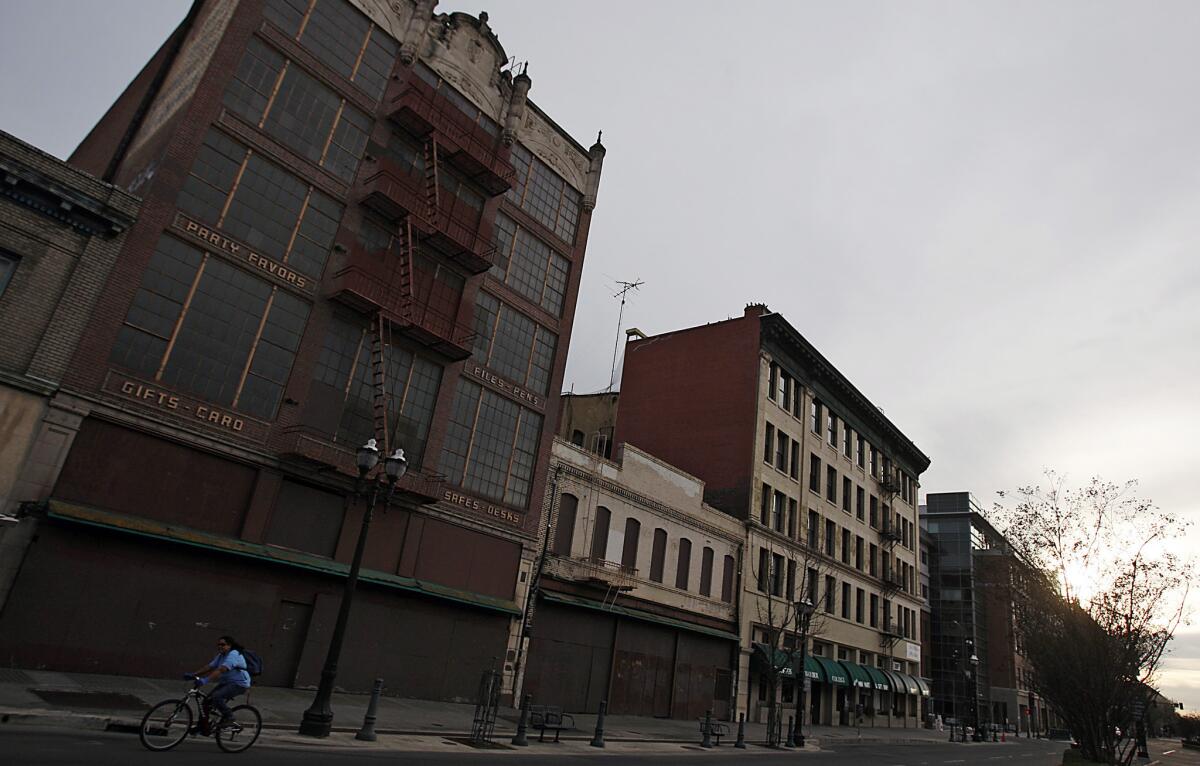Cities may use bankruptcy to cut worker pensions

- Share via
Financially pressed California cities might turn to bankruptcy as a way to cut their increasing pension costs after a judge’s ruling, experts said Thursday.
Analysts from Moody’s Investor Services, a bond rating firm, said that Wednesday’s ruling by a federal judge considering Stockton’s bankruptcy case could open the door for cities to cut retirement obligations — once considered sacrosanct.
In that ruling, Judge Christopher Klein said cities could walk away from their pension obligations — just as they can from other debts.
The ruling was lambasted by the California Public Employees’ Retirement System, which provides pension benefits to 1.7 million state and local government workers, retirees and their families, including those in Stockton.
For years, CalPERS has been trying to avoid such a court decision, arguing in the case of other cities that filed for bankruptcy protection that money for pensions could not be reduced.
The Moody analysts said they did not expect a sudden surge of cities declaring bankruptcy because many have improving finances as California’s economy continues to recover.
But Greg Lipitz, a Moody’s analyst, said the decision could have a more immediate effect for the city of San Bernardino, which filed for bankruptcy in 2012.
San Bernardino did not pay CalPERS for a year after filing for bankruptcy protection, but later agreed to resume payments.
Lipitz said the decision could prompt the city to reopen its negotiations with CalPERS. The city said Thursday that it could not comment.
But city advocates dismissed the Moody’s statement, saying no municipality wants to declare bankruptcy.
Christopher McKenzie, the executive director of the League of California Cities, said that bankruptcy has devastating effects on a city and the services it provides.
Any city deciding to reduce pension benefits would quickly lose employees, he said, especially police and other public safety workers who could easily find jobs elsewhere.
“It is widely known among city officials that a bankruptcy leaves long-term scars on services,” McKenzie said. “It’s absolutely the last alternative and you do everything to avoid it.”
Klein made the pension ruling Wednesday after Franklin Templeton Investments, which is owed $36 million by Stockton, filed a protest in the city’s bankruptcy trial.
Franklin opposes Stockton’s proposal for paying its debts and leaving bankruptcy, which would leave Franklin with a fraction of the $32 million of its loans to Stockton that are unsecured, while paying CalPERS in full.
The judge agreed with Franklin that the federal bankruptcy code — which treats creditors equally —superseded California laws that say cities cannot reduce amounts that CalPERS collects for pensions promised to workers in labor agreements.
Klein must still decide whether to approve Stockton’s plan for paying its creditors, which currently includes no cuts in payments to CalPERS. He’s expected to take that up at an Oct. 30 hearing.
Even after Wednesday’s ruling, Stockton city officials said that they had no plans to ask the judge to reduce pension payments. Full pensions are needed, they said Thursday, to keep current employees and recruit new ones.
More to Read
Inside the business of entertainment
The Wide Shot brings you news, analysis and insights on everything from streaming wars to production — and what it all means for the future.
You may occasionally receive promotional content from the Los Angeles Times.











